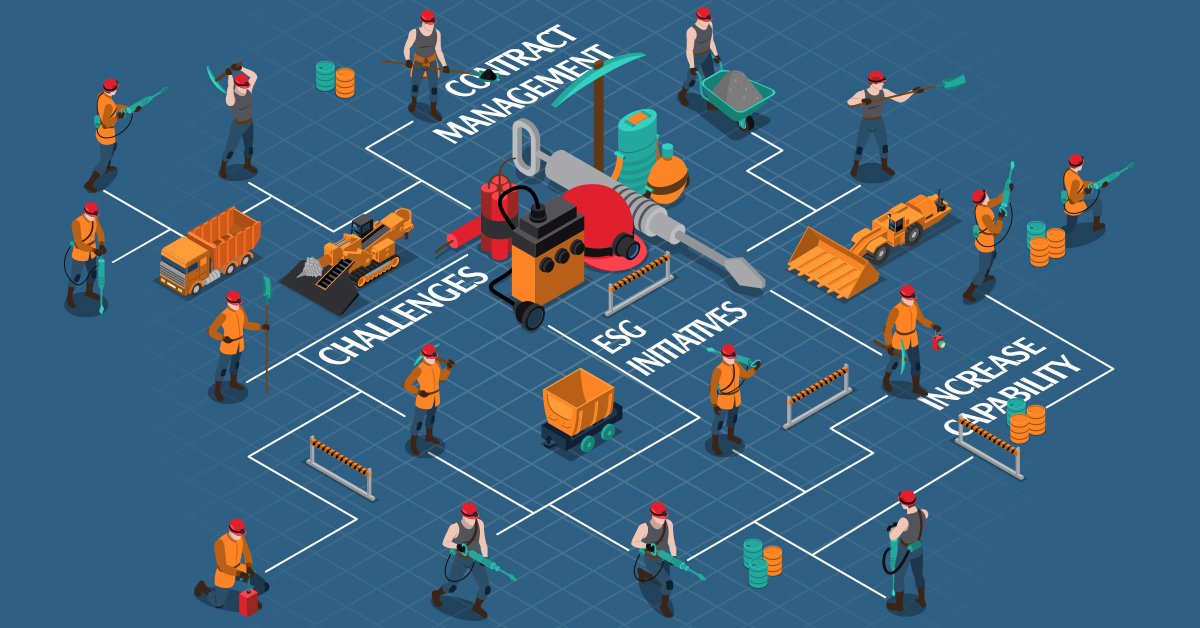Here are two facts that demonstrate the massive global influence procurement in mining has.
- Mining enjoys a significant share of global GDP with a USD2tn market size, making it a major player in international trade, capital flow and political influence.
- Procurement is often the largest source of payment made by a mining company, greater even than the combined payments to governments and salaries. Reports indicate that as much as 71% of all expenditure goes to suppliers.
Mining sites are operational for years, heavily influencing the communities around them and the fortunes of the companies that operate them. Procurement has the biggest say in the success (or otherwise) of these long-term projects. It goes without saying that the procurement function in mining companies must be running flawlessly is KPIs are to be met.
Challenges facing the mining industry
Mining companies will always be particularly vulnerable to global events, and recent years have been no exception. COVID-19 and the Ukraine-Russia conflict have wreaked havoc on supply chains, and exploration budgets tumbled as a result. While this has recovered to pre-pandemic levels and is expected to expand further in 2023, global events are always going to have to be reckoned with.
Demand for copper and cobalt in particular is expected to soar over the coming decades, and mining companies need to get their procurement function humming if they’re to capitalise on market trends while contending with natural disasters, conflicts and trade disputes.
3 Areas of Influence for Procurement in Mining
Increase capability
Procurement is always complex, but particularly so in mining. There are many roles that need to be filled and performed to a high level if KPIs are to be achieved. Each role needs to be clearly defined and a capability profile established. Communication needs to be clear and unambiguous on this point, and there needs to be an assessment process in place as well as a development plan.
The ability to up-skill procurement staff is pivotal. With standardised roles and clear development paths, this becomes a whole lot easier. Companies then need to determine the right mix of internal and external training programs, and consider using skills gap assessments within the recruitment process.
Obviously, these initiatives will lead to a more capable procurement team, but it will also create clearly defined roles that avoid cross-over, confusion and inaction.
Standardise contract management
We’ve mentioned how much of a typical mining company’s expenditure goes to suppliers. The relationships with these suppliers need to be managed correctly, which can only be done if contract management is standardised.
Any greyness or ambiguity in this area, any point at which the process isn’t clearly defined, and contract managers are likely to act on instinct or according to guidelines from previous workplaces. Both of these scenarios open a company to unnecessary risk.
Standardised practices aren’t just there to provide guidance to managers, they’re also in place to make life easier and cut through the red tape. Many small decisions and actions make up contract management, and small delays at each one can have massive implications. Plus, standardised procedures should be developed by procurement managers in consultation with legal to ensure compliance, commercial, safety and environmental responsibilities are met
Embed ESG initiatives
Mining companies have an extraordinary impact on the communities and environments in which they operate – an impact which can be profoundly positive or negative. Stakeholders and governments are increasingly concerned with environment, social and governance initiatives; this is no longer only about doing what’s right or ethical – it’s about keeping compliant with every-tightening regulations and remaining attractive to core stakeholders.
The very nature of mining and the fact that it involves thousands of suppliers indicates there is vast scope for implementing ESG initiatives. Knowing which ones are the most viable or impactful – and knowing how to pursue them – is key. This cannot be done without access to good data.
Mining companies typically deal with more information than just about any other industry, so the ability to collate, cleanse and categorise efficiently is absolutely essential. All decision-making is done based on data, and that includes choosing which ESG initiatives to pursue, how to track progress and how to report to stakeholders and governing bodies.
Mining companies simply cannot operate without the latest in cutting edge spend analytics.
Comprara is your mining procurement consultant
The team at Comprara have been providing procurement consultation for large, multinational companies for years. We advise on every step of the procurement journey and rapidly increase capability and performance. We provide skills assessments and development programs as well as our own Spend Analysis software and training to go with it.
We know the challenges faced by the mining industry in the current climate and we know how crucial the procurement function is to successfully navigating them. Get in touch today and start realising your potential.








